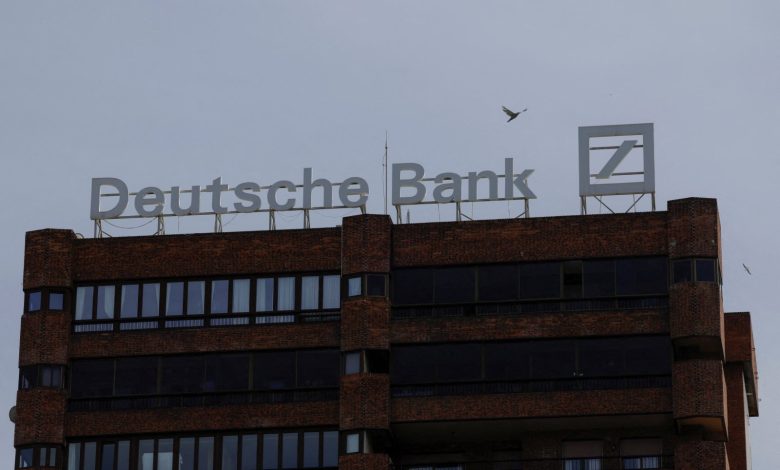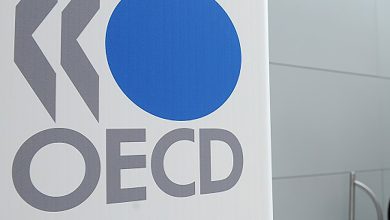Turkish economy can rebalance without hard landing: Deutsche Bank

Türkiye is likely to see strong disinflation over the coming months and a rebalancing of the economy without a hard landing, according to Deutsche Bank.
The annual inflation rate began what is expected to be a sustained fall in June, dipping more than expected to 71.6%. Monthly inflation also cooled markedly.
The Central Bank of the Republic of Türkiye (CBRT) has held its benchmark policy rate steady, vowing to act if the inflation outlook worsens, since raising rates by 500 basis points, or five percentage points, to 50% in March.
It has tightened by 4,150 basis points since June 2023, as authorities reversed a yearslong low-rates policy after presidential and parliamentary elections.
Hans-Christian Wietoska, head of Central Eastern Europe, Middle East and Africa Research at Deutsche Bank, said Türkiye has completed the first phase of rebalancing its economy and is now entering the second stage.
Wietoska described the central bank’s rate hike just before the March local elections as a “strong message and a game-changer.”
“This move marked a U-turn. Domestic and foreign investors had anticipated a devaluation of the (Turkish) lira, but the CBRT’s rate increase clearly indicated that a sharp devaluation was not part of their strategy,” he told Anadolu Agency (AA).
The annual inflation was down from 75.45% in May, the highest since November 2022.
Last month’s dip raised some expectations that the central bank would soon ease policy, with Goldman Sachs predicting a rate cut around September given building pressure on the lira.
But the CBRT Governor Fatih Karahan appeared to push back on this earlier this month.
“We are seeing signs of demand rebalancing and its impact on prices. It is not healthy to draw conclusions from a single data point in this period of high volatility. We act with the determination and caution of a central bank,” Karahan said.
The central bank forecasts a year-end inflation rate of 38%.
“We see inflation at around 40% by year-end due to slowing domestic demand, base effects and the recent stability of the lira. We expect a strong disinflation process,” said Deutsche Bank’s Wietoska.
“The key question, and also part of the second stage, is getting inflation to 20%. This is the next step, and this is a challenge because 40% will be more or less done by the end of the year,” said Wietoska, adding that it will be critical for the central bank to maintain a tight monetary stance.
Unique case
The economy will see a cooldown in the second stage and it will be important how the central bank reacts, he said.
“It’s not going to be easy, but no country with 75% inflation has been able to reduce it without entering a recession. If Türkiye can balance its economy without a recession, it could be a unique case, and we are quite optimistic about Türkiye’s success,” he added.
“However, policy errors midway should be avoided, as it can backfire.”
Deutsche Bank economists forecast Türkiye’s gross domestic product (GDP) growth at 3.5% this year, relative to an average growth rate of around 5% over the past five years.
The International Monetary Fund (IMF) expects Türkiye’s economy to grow by 3.6%, while the Organisation for Economic Co-operation and Development (OECD) forecasts 3.4% growth in 2024.
The economy expanded by 5.7% in the first quarter, one of the world’s highest growth rates at the start of the year, driven by robust domestic demand despite tight monetary policy.
Growth is slowing, and it will be a challenge in the last quarter of this year and early next year in the first quarter, according to Wietoska.
Wietoska said the right time to cut rates is when inflation starts to fall and the economy slows down.
He added that they do not believe the central bank will slash interest rates by more than 500 basis points by the end of the year.
Moody’s review in focus
Since Türkiye shifted to orthodox macroeconomic policies, there has also been an improvement in the stance of international investors, according to Wietoska.
Global investors are eying Turkish lira bonds, with $8.5 billion inflows already seen over the past eight weeks, he said.
“It can even go to $20 billion. There is room for at least another $10 billion to $15 billion in inflows by the end of this year. More can follow next year, with room for overall foreign exposure of $30 billion to $40 billion, compared to the current around $10 billion,” Wietoska noted.
In a research note published early this month, Deutsche Bank said local Turkish bonds “offer extremely attractive entrance levels.”
Markets will also be focusing on Moody’s review of Türkiye, due to be announced on Friday.
The global credit rating agency revised Türkiye’s outlook to positive from stable, affirming its ‘B3’ credit rating in its January review. Current expectations are that the rating will be upgraded to ‘B2.’
In March, Fitch Ratings upgraded Türkiye’s credit rating from “B” to “B ” and its outlook from stable to positive, while S&P has also raised its grade to “B ” from “B” and assigned a positive outlook.






